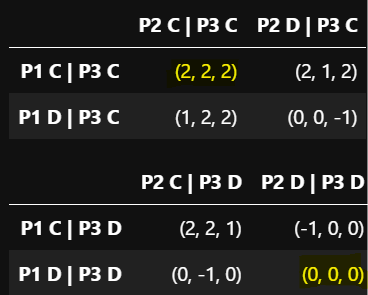Elon vs. Congress with Game Theory
Can Congress cooperate to reassert power over the purse strings?
Republican lawmakers have publicly been praising Elon and DOGE while privately raising concerns. I remember Republicans doing the same to Trump during his first term. Do I think these people are lying when they raise concerns in private? I don’t. Then why do they wear one face off the record, and another to the multitude? Their incentives.
By publicly going against Elon/Trump they are inviting Elon/Trump to fund/endorse a primary challenger for their seat. It’s safe to assume your average House Representative or Senator would prefer to be reelected over winning praise from traditional media for publicly opposing Elon. They like media praise, but they like their jobs more. I’m not saying there are no principled politicians, but I am saying there are more Ted Cruzes than Jeff Flakes or Mitt Romneys.
So they may have a harder primary race if they publicly pushed back against Elon. What would they gain? If enough of them pushed back it’d help clear up that Congress actually controls the purse strings of the US federal government. That’s pretty big. I assume most members of congress would rather be a part of an institution with power rather than a rubber stamp body. Also positive media coverage. I set up a game to model this incentive structure.
A game theoretic model of Congress vs. DOGE
In this toy game there are 3 players that are members of an institution, like Congress. They have 2 actions; cooperate (stand up for their institution) or defect (do nothing or privately say they’re concerned). If at least 2 of them cooperate, the cooperators get a payoff of 2 and the free-rider (if any) gets 1. The payoff of 2 represents maintaining your institution’s power and getting positive media coverage. The payoff of 1 represents the player’s institution maintaining power. If fewer than 2 players cooperate, players who defect get a payoff of 0 and the cooperator (if any) gets a payoff of -1. The 0 represents the institution losing its power and the -1 represents that plus having your job threatened. I’ve set up the payoff matrices below. It is really a 2x2x2 payoff cube, but that is hard to represent here. “C” means cooperate, “D” means defect, and “|” means “conditional on.”
There are two Nash equilibria in this game; either everyone stands up for their institution, or no one does. Although the three players are happiest if they all cooperate, neither strategy is more likely to happen than the other since they are both Nash equilibria.
Right now, GOP lawmakers (who control both houses) are not publicly asserting for Congress’ authority (i.e. they’re all defecting). But the game set-up above says they could choose to all cooperate instead. Of course, this game is much simpler than the actual situation. There are 218 House Republicans and 53 in the Senate. That is more than the 3 players I modeled. Additionally, the amount that need to step forward to succeed in pushing back against DOGE is unknown. They also have more actions like backchanneling with the White House. I do not claim to perfectly model the situation. I simply think this model gives a little insight.
The game changes when incentives change
Right now, a strong plurality of Americans do not want Elon involved in the Trump administration at all. However, a majority of self-identified Republicans do. Self-identified Republicans are the population of interest in a primary election, so they’re more important in this analysis. Republicans likely fear Elon will fund a primary challenger if they go against him. What if he becomes less popular with Republican voters? Say he messes with Medicaid payments which will affect a lot of Republicans.
Let’s alter the payoff matrices from before. Replace the -1 with a 1 when a player cooperates and the others defects. This reflects positive coverage of the candidate for opposing the unpopular cuts which more than offsets the primary challenge. As you can see below, there is only one Nash equilibrium and it is for all the players to cooperate and defend their institution.
What’s next?
If you gave me even money odds (with non-excessive vigorish) on the direction of DOGE’s and Elon’s popularity, I’d bet on them to go down. Purely because of thermostatic public opinion. The public tends to want less of whatever is going on. If that hypothetical bet pays off, Republican congressman will be facing a game more like the second, where it is clear they should all cooperate to stand up for the institution of Congress.
But hey, I could be wrong. Maybe we’ll get fully automated luxury straight space capitalism and everyone will be super jazzed about Elon and DOGE. Or the butterfly revolution is actually happening and Congress won’t even matter anymore.
On that pessimistic note, I’m signing off.
P.S. If you liked this article, check out my last one. I also appreciate constructive feedback.






